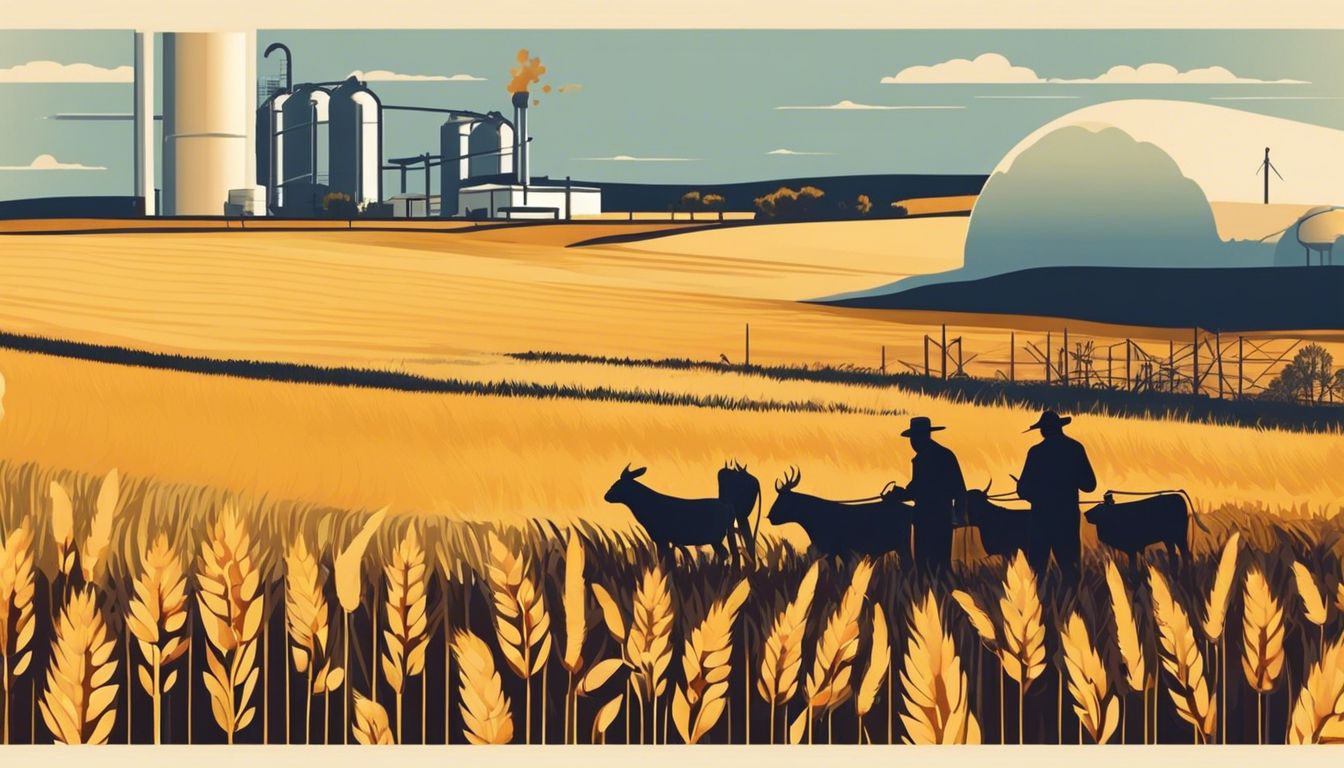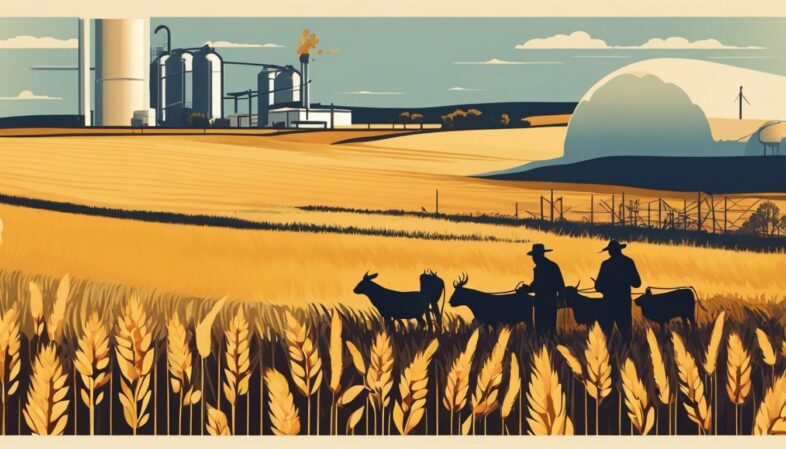Methane vs CO2: Greenhouse gases like methane and CO2 trap heat in our atmosphere. Everyone now recognises that methane is a powerful greenhouse gas, even more potent than CO2. So why do some say methane creates 30 times more warming than others who say 80 times?
So, which is right?
The answer is simply that it depends on the timescale over which you measure it. Over 100 years, it has over 28 times the warming potential of CO2 but will can do 80 times more warming over just 20 years.
Methane only stays in the air for about 12 years; much less than CO2 which can last for centuries.
Still, methane's quick impact means we need to tackle its emissions fast.
For you and I, alive today, our lives will be affected by the warming in the next 20 or so years. That also matters, because after 2050 emissions should be much lower, assuming decarbonization does take place. By that guideline, the higher 20-year multiplier of 80 is the one we should be using. It's the one that will most affect limiting global temperature rise to 1.5 ºC.
Different activities release these gases into the air. For instance, cows and natural gas operations send out lots of methane. Because methane warms our planet quickly, reducing it could really help slow climate change.
While both these gases affect our climate, they work in different ways and require different solutions.
Understanding how methane and CO2 compare helps us find better ways to protect our environment before it's too late. Let's explore their roles as greenhouse gases further!
Key Takeaways
- Methane is 80 times more potent at trapping heat than CO2 over a 20-year period, but it only stays in the atmosphere for about 12 years. This means quick action on methane can help slow global warming fast.
- Cows make lots of methane when they digest food. Farms all over the world are working to cut down on this gas by changing what cows eat.
- Leaks from oil and gas production add a lot of methane to the air. Fixing these leaks fast is an important step to fight climate change.
- Working together around the world is key for reducing methane emissions. By sharing ideas and tools, countries can do more to tackle this problem.
- The IPCC says we need to catch and use the methane coming from landfills instead of letting it go into the air. This will help slow down climate change quickly.
Difference between Methane and CO2 as Greenhouse Gases

Methane and CO2 differ in potency and lifetime in the atmosphere, with methane being more potent but shorter-lived. Their sources of emissions also vary, with methane from human activity primarily coming from natural gas, agriculture, and oil and gas production, while CO2 mainly results from fossil fuel combustion.
Both gases have a significant impact on climate change.
Potency and lifetime in the atmosphere
We will say it again because this is really important:
Methane is 80 times more potent than CO2 in trapping heat over a 20-year period. This startling fact highlights methane's incredible impact on our planet's temperature. Despite its power, it stays in the atmosphere for a shorter time, around 12 years, contrasting sharply with carbon dioxide's centuries-long presence.
These characteristics make methane a key player in short-term climate change dynamics. Swift action to cut methane emissions can have immediate benefits for air quality and slow down the rate of global warming.
Tailoring strategies to address this potent gas is critical as we work towards stabilising greenhouse gas concentrations and protecting our atmosphere.
Sources of emissions
Understanding the potency and lifetime of greenhouse gases in the atmosphere leads us directly to their sources. It's crucial to identify where methane and CO2 come from to tackle their impact on global warming.
- Fossil fuel production is a major source of methane emissions. When we extract and process oil, gas, and coal, methane often leaks out.
- Livestock farming, especially cattle, contributes significantly to methane levels. Cows produce methane during digestion.
- Landfills are also responsible for releasing methane. As organic waste breaks down, it generates this potent gas.
- The rice farming process emits methane too. Flooded fields create an environment where bacteria thrive and produce methane.
- Energy production often involves flaring—burning excess gas—which releases CO2 into the atmosphere.
- Transportation is a big emitter of CO2. Cars, trucks, planes, and ships burn fossil fuels and push out carbon dioxide.
- Industrial processes can emit both gases. Making cement or steel involves chemical reactions that release CO2; some industrial leaks release methane.
- Deforestation has a dual role: it decreases the number of trees that absorb CO2 and can involve burning vegetation, which releases carbon dioxide and sometimes methane.
- Wildfires naturally occurring or human-caused can lead to significant emissions of both CO2 and methane depending on what is burning.
- Energy use in homes and businesses produces CO2 when we burn natural gas for heating or use electricity generated from fossil fuels.
Impact on climate change
Looking at it another way:
Methane traps much more heat in the atmosphere than CO2, driving up temperatures quickly. It is over 28 times better at holding warmth than carbon dioxide over a hundred years. Yet when we look closer, methane's impact skyrockets; it's 80 times stronger as a heat trapper compared to CO2 for two decades after its release.
This makes it a key player in climate change.
Its shorter lifespan means that cutting methane emissions can quickly lower global warming rates. Keeping this potent gas in check can give us quick wins against rising temperatures and violent weather patterns.
Methane reduction stands out as an effective strategy in our fight to cool down the planet swiftly. We move on now, looking at how methane compares with CO2 across different timelines and contexts, each offering unique insights into their roles in climate change discussions.
Comparing Methane and CO2 in Climate Change Discussions

Methane and CO2 are often compared in climate change discussions, with a focus on their 100-year vs 20-year timescales and understanding the differences in warming potential. It's important to contextualise methane emissions from cattle and other sources to fully grasp their impact.
100-year vs 20-year timescale
Understanding the impact of greenhouse gases on our climate requires consideration of their lifetime in the atmosphere and potency over different timescales. Methane and carbon dioxide differ significantly in these respects, influencing how each contributes to global warming.
Methane, while more potent, has a shorter life span, complicating its evaluation in climate models. Let us explore these differences within a 100-year and a 20-year timeframe.
| Timescale | Methane (CH4) | Carbon Dioxide (CO2) |
|---|---|---|
| 20-year | 80 times more potent than CO2 at warming | Baseline for comparison |
| 100-year | More than 28 times the warming potential of CO2 | Continues to influence climate for centuries |
Within two decades, methane's impact is particularly severe, driving urgent discussions on emissions reductions. Conversely, over a century, CO2‘s influence prevails despite methane's higher initial potency.
Researchers must weigh these timelines, understanding that methane's short-term reduction could significantly alter near-future warming trajectories. The debate continues in scientific circles, mapping strategies that best address the complexities of these greenhouse gases.
Our understanding of methane's role in climate change sets the stage for deeper insights into its sources and mitigation opportunities.
By tackling methane emissions now, we can make rapid progress while still working on the tougher challenge of reducing carbon dioxide levels, which linger for much longer in our atmosphere.
Contextualising methane emissions from cattle
Cows play a unique role in the climate story. They release methane during digestion. This gas is different from CO2 because it traps more heat but stays for less time in the atmosphere.
When cows eat grass, they ferment it in their stomachs and produce methane as a by-product. This process happens on farms all over the world.
Farmers are looking into ways to lower these emissions. They try new feeds that make cows burp less methane. Global collaboration is key to finding solutions that help farmers and protect our planet.
The next step involves tackling this issue head-on, recognising its weight in global warming discussions.
The Urgent Need to Address Methane Emissions
Methane emissions play a significant role in accelerating global warming, making it crucial for us to prioritise reduction and mitigation efforts. Explore the impact of methane vs CO2 as greenhouse gases further by reading on..
Role in accelerating global warming
Methane emissions pack a powerful punch in the climate change fight. They trap heat in the atmosphere far more effectively than CO2, making them a key player in global warming. Despite its short life of around 12 years, methane's impact is strong due to its high global warming potential.
It quickly adds up to raise the earth's temperature.
Reducing leaks from oil and gas industries, along with managing waste and agriculture practices better, can make big differences swiftly. These steps need worldwide effort if we're going to tackle this challenge head-on.
Climate change amelioration's “low hanging fruit”
With its role in accelerating global warming, addressing methane emissions presents a low-hanging fruit for climate change amelioration.
It's crucial to highlight that reducing methane emissions can more rapidly mitigate the impact of global warming due to its potent heat-trapping potential than any other action we can take.
The urgency lies in taking actionable steps towards mitigating methane emissions as they significantly contribute to the current climate crisis. These steps include enhancing infrastructure to reduce leaks from natural gas systems and controlling methane releases from livestock digestion and manure management, offering a strategic approach for immediate impact on global warming.
Efforts aimed at minimising human-induced methane sources, such as fossil fuel extraction and agriculture practices, are imperatively pivotal in combatting climate change effectively.
5 top actions for reduction and mitigation
- Implementing improved techniques in natural gas production and distribution to minimise methane leaks.
- Enhancing leak detection and repair programmes in the oil and gas industry to swiftly address methane emissions.
- Advancing livestock management practices to reduce methane emissions from cattle through dietary adjustments and waste management strategies.
- Encouraging the use of anaerobic digesters to capture methane emissions from organic waste, turning them into energy sources.
- Investing in renewable energy sources to displace fossil fuel combustion, which produces significant methane emissions.
Importance of global collaboration
Collaboration on a global scale is crucial for addressing methane emissions and their impact on climate change. International cooperation can ensure that reduction efforts are comprehensive and effective, considering the diverse sources of methane emissions worldwide.
The sharing of best practices, technologies, and policies between countries is essential in developing holistic strategies to mitigate methane emissions. This collaboration will also facilitate the monitoring and verification of emission reductions, promoting transparency and accountability in the global effort to combat climate change.
In addition, global collaboration enables the pooling of resources for research and innovation aimed at identifying new opportunities for reducing methane emissions across various sectors.
IPCC report on progress vs COP landfill methane capture
The IPCC's latest findings show a critical need for addressing methane emissions, particularly from landfills, which are a significant source of this potent greenhouse gas. This need aligns with the actions and discussions at COP, where landfill methane capture has been a key focus.
| Aspect | IPCC Report Findings | COP Actions on Landfill Methane Capture |
|---|---|---|
| Methane's Climate Impact | Methane is identified as 80 times more potent than CO2 over 20 years, accelerating global warming. | Recognition of methane as a critical target for immediate climate change mitigation strategies. |
| Reduction Potential | Significant methane emission reductions can rapidly influence the rate of climate change. | Commitments to enhance landfill gas capture and conversion technologies are made. |
| Global Collaboration | Calls for international cooperation to effectively mitigate methane emissions. | Multiple nations pledge to collaborate on landfill methane reduction projects. |
| Timescales of Action | Emphasises the urgent need for short-term methane emission controls. | Discussions on policies to implement methane capture solutions within a specific timeframe. |
| Current vs Target Levels | Reports current methane levels as a driver behind climate change with a call for drastic cuts. | Setting of measurable targets to monitor progress in methane capture from landfills. |
The juxtaposition of IPCC highlights against COP actions reveals a unified stance on the importance of methane management.
Although there is a gap between current methane emissions and the desired reductions, both entities emphasise the need for immediate and collaborative efforts in landfill methane capture to mitigate its impact on climate change.
Conclusion
In conclusion, methane and CO2 have distinct impacts as greenhouse gases. There is a critical need to reduce methane emissions due to their high heat-trapping potential, particularly within a 20-year timeframe given their significant impact on global warming.
Many scientists stress the necessity for transparent reporting of methane and CO2 emissions, ethical considerations regarding their reduction, and regulatory compliance to ensure honest disclosure across industries.
When it comes to integrating this knowledge into everyday life, we recommend promoting energy-efficient practices and supporting initiatives that focus on reducing methane emissions from various sources. Above all, advocate for prioritising efforts to mitigate methane emissions' impact due to their substantial contribution towards climate change mitigation.
Not unexpectedly, for his blog, we also encourage our readers to inform all that will listen of the climate change mitigating effects of the anaerobic digestion process.
FAQs
1. Why is methane worse than CO2 for global warming?
Methane is a potent greenhouse gas that traps heat more effectively than CO2, making it a big concern for global warming even though there's less of it in the atmosphere.
2. How long does methane stay in the air compared to CO2?
Methane doesn't stay as long in the atmosphere as carbon dioxide does, but its impact on warming Earth is stronger over a shorter time due to its high Global Warming Potential (GWP).
3. What are we doing to reduce methane and CO2 emissions?
To tackle emissions, we're moving towards energy efficiency—like using energy-efficient appliances—and exploring low-carbon alternatives such as decarbonisation strategies like Carbon Capture and Storage (Sequestration) (CCS).
4. Do human activities add a lot of CO2 and methane to the atmosphere?
Yes, burning fossil fuels for electricity or heat and farming practices release both CO2 and methane into our clean air, affecting climate change.
5. Can anything offset these harmful greenhouse gases?
Indeed, planting trees can help, while investing in renewable energy sources helps us save energy. Also, improving waste management reduces how much methane escapes into the air.
6. How do scientists know so much about these gases' effects on our climate?
The Intergovernmental Panel on Climate Change studies data from around the world to better understand greenhouse gas emissions impacts as they tell us what's happening with things like atmospheric CO2 levels and fluorinated gases.





